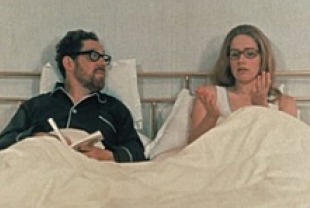We are used to looking for deep metaphysical meanings in the films of Swedish director Ingmar Bergman. We try to decipher the symbols and analyze the import of his cinematic techniques. One of his most consistent themes is the human condition as revealed through the intimate relationships of men and women. He loves to explore marriage and its variations on loyalty and fickleness, love and hate, sharing and loneliness. Similar to The Lie, Scenes from a Marriage deals with a marriage that is falling apart after 10 years.
When we first meet Johan (Erland Josephson) and Marianne (Liv Ullmann), they are being interviewed for a magazine article. As a couple they are attractive, well-educated, and professional. They have two daughters and a close relationship with their parents. On the surface everything in their marriage seems tranquil and cheery. But as they are entertaining some friends, we see how they shy away from anything deeply personal. Their friends (Bibi Andersson and Jan Maalmsjo) reveal the misery of their own relationship, managing to mix humor and hate in a verbal battle.
All is not well in Johan and Marianne's relationship. Their sex life is in shambles; she feels hemmed into a routine despite her job as a lawyer, and he wants to be released from their life of "evasions and restrictions and refusals." One evening, he brutally tells her that he is in love with a younger woman and will be going away with her to Paris. Johann has taken a six-month leave of absence from the university where he teaches. Like other Bergman males, he's seeking a fresh lease on life from a different woman than the one who loves him.
The most poignant aspect to Scenes from a Marriage is the turnarounds in these two after they separate. As Johan grows weaker, less secure, and lonely; Marianne begins the first honest appraisal of her life — "To my surprise I have to admit that I don't know who I am." Later after their divorce, Johan admits, "We're emotional illiterates." Their lives cross again through the years, and they realize the bond between them cannot be broken. In a powerfully affecting scene, Johan states: "I think I love you in my imperfect and rather selfish way. And at times I think you love me in your stormy emotional way." The point is crystal clear: in breaking out of their marriage they have created the best possible relationship they can have. Although they are still lonely in their remarriages, both Johan and Marianne have at least come to terms with each other at last.
Bergman's film is dramatically absorbing and relentlessly searching in its probe on this couple. Liv Ullmann gives a stunning performance as she modulates Marianne's many changes. The drama is not always easy to take but then neither is life nor love. Bergman does not seek to make us happy with his cinema but he does want to keep us honest.
The DVD has both the 299-minute version that originally aired on Swedish television and the 163-minute version that was released to movie theaters. Film scholar Peter Cowie compares the two versions. Interviews with Liv Ullmann, Erland Josephson, and Ingmar Bergman round out this excellent release.
